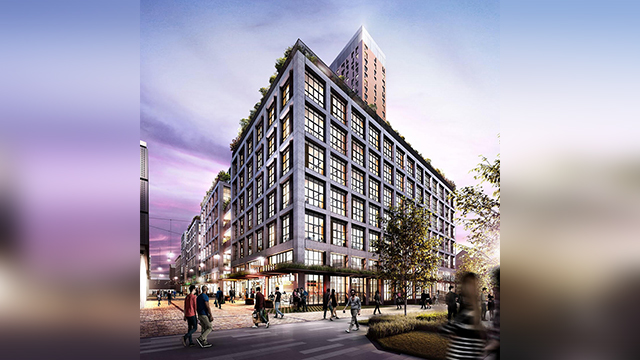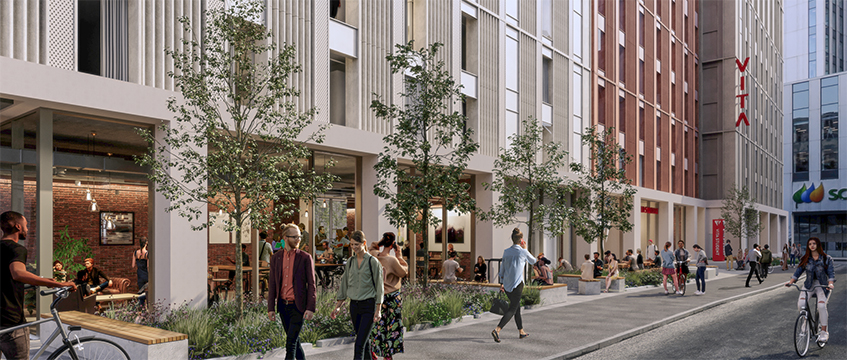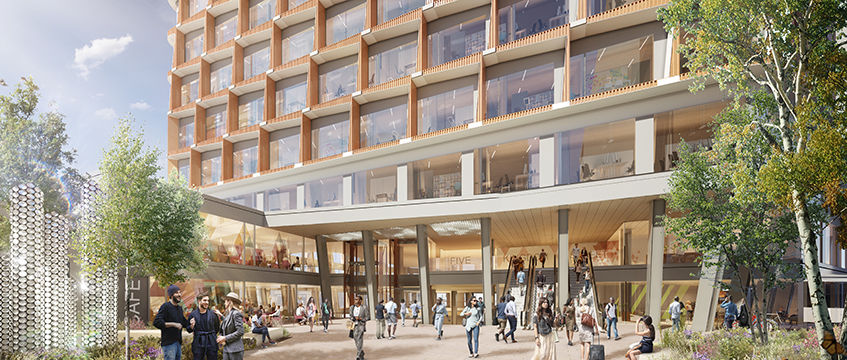British Land has Paddington tower plans refused
British Land has been advised to “go back to the drawing board” on a landmark building for its Paddington campus, as City of Westminster Council refused permission for its 21-storey office tower, claiming it would damage the character and appearance of the local area.
The London-listed real estate investment trust had sought the go-ahead for updated plans for 5 Kingdom Street, W2, on its 11-acre Paddington Central campus.
British Land revealed fresh plans for the tower last May, describing the building as “the final piece” of the Paddington campus.
British Land has been advised to “go back to the drawing board” on a landmark building for its Paddington campus, as City of Westminster Council refused permission for its 21-storey office tower, claiming it would damage the character and appearance of the local area.
The London-listed real estate investment trust had sought the go-ahead for updated plans for 5 Kingdom Street, W2, on its 11-acre Paddington Central campus.
British Land revealed fresh plans for the tower last May, describing the building as “the final piece” of the Paddington campus.
Since British Land bought Paddington Central in 2013, the company has invested close to £100m in upgrading the public realm, developing 4 Kingdom Street and improving the area’s retail and leisure offering. Tenants on the campus include Microsoft, Sasol and Visa.
Permission was granted for a 13-storey building on the site in 2010, at the same time as 4 Kingdom Street. The development site is currently a pop-up bar and restaurant space known as Pergola.
The updated 21-storey plans, designed by Allies and Morrison, included 18 storeys of office space, with 87,000 sq ft of community, retail and leisure space in a former Crossrail works site below street level, which would include a 250-seat auditorium. There would also be a new public route passing through the base of the building.
Fine balance
The council’s planning applications sub-committee was recommended to reject the building on “design, townscape and heritage asset grounds”, with a report arguing that it would “harm the character and appearance” of the surrounding area.
British Land had made several offers of ways to offset harm, including a £1.75m payment into the council’s affordable housing fund; allowing local community groups to book space in the building free of charge; the provision of affordable workspace; a £50,000 small business fund for local start-ups; and investment in local infrastructure.
Michael Meadows, British Land’s planning director, told the council’s planning applications sub-committee that the company had held its largest ever consultation for a stand-alone project on this development, adding that it recognised the objections and had sought to strike the right balance between additional height and public benefits.
The 2010 plans are “outdated”, Meadows said, and would deliver “just” £1.3m in section 106 contributions. The new scheme, he added, would deliver more than £25m in s106 and community infrastructure levies, as well as the other benefits the company outlined in its proposals.
“As a long-term investor and stakeholder in Paddington, we acknowledge our shared responsibility to maximise positive impacts from development,” Meadows said.
“However, this package of public benefits and CIL payment would not be possible without the additional height over the consented scheme. While the recommendation [to refuse permission] is disappointing, we believe that an appropriate balance has been struck between height and public benefits, and that 5 Kingdom Street will deliver substantial benefits and opportunities for Westminster and its residents.”
Little to celebrate
Ward councillors, local amenity societies and residents all raised objections to the project, although several who presented at the planning meeting spoke highly of British Land’s consultation process and efforts as a landlord to engage with the local community.
The building’s appearance and impact on nearby residents and heritage assets were singled out for criticism, with the council’s report noting that it would be “unlike almost all buildings” in the surrounding area and would impact several views, including those from the Serpentine Bridge.
Matthew Green, a councillor representing the nearby Little Venice ward, said the nature of 5 Kingdom Street being planned as a “landmark building” meant it was “deliberately designed to stick out like a sore thumb” and “to be obtrusive”.
He went on to compare its unorthodox shape to a box of Celebrations chocolates, taking a box from his bag before being told by committee chairman Robert Rigby that he was not meant to bring support props to his presentation.
Melvyn Caplan, also representing Little Venice, praised British Land as a developer but criticised the plans, and said the company should go “back to the drawing board”.
“There is too much harm that is incurred here with these views, and no amount of money and benefits that you put on the table can actually take that away,” he said, adding: “Saying that ‘you get all this CIL money takes that harm away’? That’s not what planning in this city should be about. It is about appropriate buildings in the appropriate location.”
All four members of the council committee rejected the development. Rigby described it as a “contentious” proposal, adding that it was “quite unprecedented” for an application to receive such strong objections from three neighbouring wards. Ultimately, Rigby said, the proposed building was “too dramatic, too harmful”.
“As a landmark building, it needs to make a statement,” he said. “Certainly, the building we see in front of us does make a statement, but I have to say I think it makes the wrong statement.”
Fellow committee member James Spencer described the building as “completely inappropriate” for the area, although he praised its design. “There will be benefits with this building, but there are very limited benefits for the people in the local area,” he said. “We’ve got to be sensitive to the surrounding area and its neighbours.”
Following the planning meeting, a spokeswoman for British Land said: “We are disappointed with Westminster’s decision to refuse planning permission for 5 Kingdom Street. We believe that the scheme would deliver much-needed workspace, capitalising on the significant recent investment in Paddington, as well as providing many direct benefits to Westminster and its residents through a mix of employment, leisure, cultural and community uses. We will now consider our options.”
The application will be referred to London mayor Sadiq Khan.
To send feedback, e-mail tim.burke@egi.co.uk or tweet @_tim_burke or @estatesgazette











